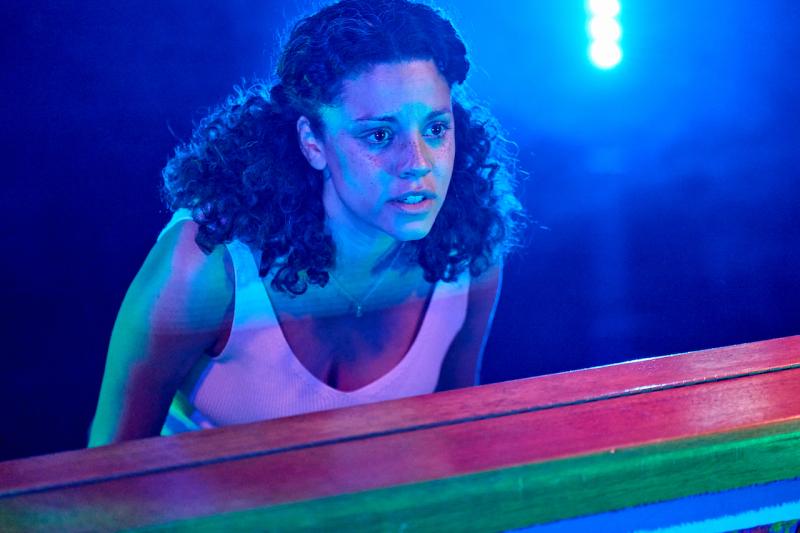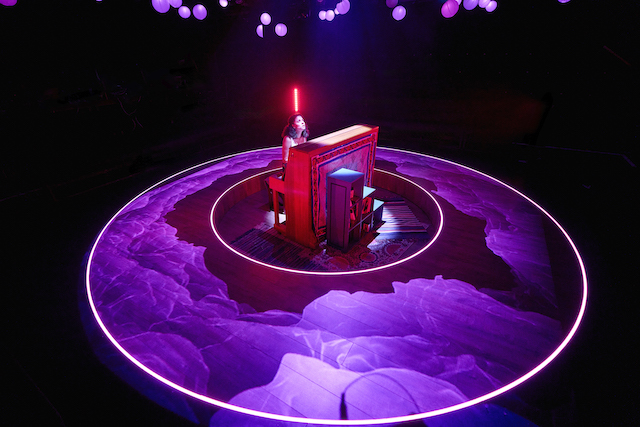Elephant, Menier Chocolate Factory review - subtle, humorous exploration of racial identity and music | reviews, news & interviews
Elephant, Menier Chocolate Factory review - subtle, humorous exploration of racial identity and music
Elephant, Menier Chocolate Factory review - subtle, humorous exploration of racial identity and music
Story of self-discovery through playing the piano resounds in Anoushka Lucas's solo show

This charmingly eloquent semi-autobiographical show – which first played at the Bush Theatre in 2022 – tells the story of a girl whose life growing up in a council flat is transformed by the arrival of an upright piano. Lylah – like the show’s creator, Anoushka Lucas – is the daughter of an Anglo-Indian father and a French Cameroonian mother, and her subtle, often humorous, exploration of her racial identity becomes intertwined with who she is as a musician.
Lucas has won several plaudits as an actor and singer in shows including Regent Park Open Air Theatre’s Jesus Christ Superstar and the Young Vic’s Oklahoma!. In this new production of her solo show – for which she has written the script and composed the songs – she starts with a quasi-philosophical reflection on the mechanisms of sound, making us consider how the vibrations from the piano are physically connecting all of us.
It’s a gently ingenious way of encouraging us to think about how music, far from being an abstract concept, derives part of its power from quite literally getting under our skin, fusing us no matter what our race or class. She heightens the sense of this transcendent aspect of music by describing how when her upright piano first arrives at their flat, they have to take the windows out to get it in, so that it swoops into their home like a mythical being as their surroundings flood with light.
Though the piano's impact is positive, it brings with it a complex history and Lylah soon realises that she has more in common with it than she ever imagined. Throughout the show, Lucas is adept at metamorphosing from the happy little girl Lylah once was to the young woman who’s forced to ask difficult questions about the way people perceive her mixed race identity. As a schoolgirl, she gets a scholarship to London’s French Lycée, where she excels, and though she’s teased by one girl for the colour of her skin, she doesn’t feel herself to be an outsider. But then she realises that – as with her piano – people misunderstand who she is, because they fail to comprehend her heritage.
While most people focus on the great European piano making tradition, Lylah becomes transfixed by the fact that some pianos are made from mahogany – which comes from the West Indies – and ivory keys that are plundered from elephant tusks. Since ivory tusks are embedded so deep in the elephant skull that they reach almost to the eye, they can only be removed either by causing unbearable pain, or – more habitually – by killing the animal outright. Jess Edwards’ elegantly conceived production puts the upright piano on a revolving stage, where it is contained within the smaller of two concentric circles. As Lucas talks, sometimes she lies on the piano, sometimes she balances on it, and at – moments of vulnerability – sometimes she huddles herself into it, as if seeking protection.
Jess Edwards’ elegantly conceived production puts the upright piano on a revolving stage, where it is contained within the smaller of two concentric circles. As Lucas talks, sometimes she lies on the piano, sometimes she balances on it, and at – moments of vulnerability – sometimes she huddles herself into it, as if seeking protection.
One of those moments is when Lylah is talking to producers about putting out an album, and they try to package her as the next Alicia Keys. She’s advised that she needs to capitalise more on being working-class, as well as on her ethnic origins. Though this advice is tone-deaf, it's eclipsed by another set of stereotypes that's hurled at her when she goes to stay with the wealthy family of her white boyfriend, Leo, and realises how blind they are to the consequences of empire. When Leo's grandmother asks her in fruitily upper-class tones whether she is a "quadroon", Lylah bites her tongue, only to get drunk later in the evening and castigate the entire family for their cultural insensitivity.
It says much about Lucas that – even at this moment – the show never feels like a rant; it’s all part of a subtle, playful discourse on the different things that make us who we are. Who we inherit our laugh from, our eyes, our freckles, and yes, the colour of our skin, is often the result of random encounters that sometimes feel consequential and others not.
The evening is interspersed with songs that she delivers in a powerfully mellifluous singing voice. Laura Howard’s engaging lighting design flickers to the notes so that it feels as if we’re part of an enjoyable synaesthetic experiment.
What Lucas ultimately proves is that her talent – and indeed her identity – is too nuanced to be put into any kind of box. This show feels like an engaging first chapter – it will be fascinating to see what she writes about next.
rating
Explore topics
Share this article
The future of Arts Journalism
You can stop theartsdesk.com closing!
We urgently need financing to survive. Our fundraising drive has thus far raised £33,000 but we need to reach £100,000 or we will be forced to close. Please contribute here: https://gofund.me/c3f6033d
And if you can forward this information to anyone who might assist, we’d be grateful.

Subscribe to theartsdesk.com
Thank you for continuing to read our work on theartsdesk.com. For unlimited access to every article in its entirety, including our archive of more than 15,000 pieces, we're asking for £5 per month or £40 per year. We feel it's a very good deal, and hope you do too.
To take a subscription now simply click here.
And if you're looking for that extra gift for a friend or family member, why not treat them to a theartsdesk.com gift subscription?
more Theatre
 Elephant, Menier Chocolate Factory review - subtle, humorous exploration of racial identity and music
Story of self-discovery through playing the piano resounds in Anoushka Lucas's solo show
Elephant, Menier Chocolate Factory review - subtle, humorous exploration of racial identity and music
Story of self-discovery through playing the piano resounds in Anoushka Lucas's solo show
 This is My Family, Southwark Playhouse - London debut of 2013 Sheffield hit is feeling its age
Relatable or stereotyped - that's for you to decide
This is My Family, Southwark Playhouse - London debut of 2013 Sheffield hit is feeling its age
Relatable or stereotyped - that's for you to decide
 The Frogs, Southwark Playhouse review - great songs save updated Aristophanes comedy
Tone never settles, but Sondheim's genius carries the day
The Frogs, Southwark Playhouse review - great songs save updated Aristophanes comedy
Tone never settles, but Sondheim's genius carries the day
 Mrs Warren's Profession, Garrick Theatre review - mother-daughter showdown keeps it in the family
Shaw's once-shocking play pairs Imelda Staunton with her real-life daughter
Mrs Warren's Profession, Garrick Theatre review - mother-daughter showdown keeps it in the family
Shaw's once-shocking play pairs Imelda Staunton with her real-life daughter
 The Crucible, Shakespeare's Globe review - stirring account of paranoia and prejudice
Ince's fidelity to the language allows every nuance to be exposed
The Crucible, Shakespeare's Globe review - stirring account of paranoia and prejudice
Ince's fidelity to the language allows every nuance to be exposed
 The Fifth Step, Soho Place review - wickedly funny two-hander about defeating alcoholism
David Ireland pits a sober AA sponsor against a livewire drinker, with engaging results
The Fifth Step, Soho Place review - wickedly funny two-hander about defeating alcoholism
David Ireland pits a sober AA sponsor against a livewire drinker, with engaging results
 The Deep Blue Sea, Theatre Royal Haymarket review - Tamsin Greig honours Terence Rattigan
The 1952 classic lives to see another day in notably name-heavy revival
The Deep Blue Sea, Theatre Royal Haymarket review - Tamsin Greig honours Terence Rattigan
The 1952 classic lives to see another day in notably name-heavy revival
 The Brightening Air, Old Vic review - Chekhov jostles Conor McPherson in writer-director's latest
The Irishman's first new play in over a decade is engaging but overstuffed
The Brightening Air, Old Vic review - Chekhov jostles Conor McPherson in writer-director's latest
The Irishman's first new play in over a decade is engaging but overstuffed
 1536, Almeida Theatre review - fast and furious portrayal of women in Henry VIII's England
This wild, intelligent play is a tour de force till the doom-laden finale
1536, Almeida Theatre review - fast and furious portrayal of women in Henry VIII's England
This wild, intelligent play is a tour de force till the doom-laden finale
 The Comedy About Spies, Noel Coward Theatre review - 'Goes Wrong' team hit the spot again
More mayhem from the Mischief company
The Comedy About Spies, Noel Coward Theatre review - 'Goes Wrong' team hit the spot again
More mayhem from the Mischief company
 House of Games, Hampstead Theatre review - adapted Mamet screenplay entertains but is defanged
Richard Bean has turned Mamet's steel trap into an amusing puzzle
House of Games, Hampstead Theatre review - adapted Mamet screenplay entertains but is defanged
Richard Bean has turned Mamet's steel trap into an amusing puzzle
 Here We Are, National Theatre review - Sondheim's sensational swan song
The late composer bids farewell with a show made-to-order for now
Here We Are, National Theatre review - Sondheim's sensational swan song
The late composer bids farewell with a show made-to-order for now

Add comment